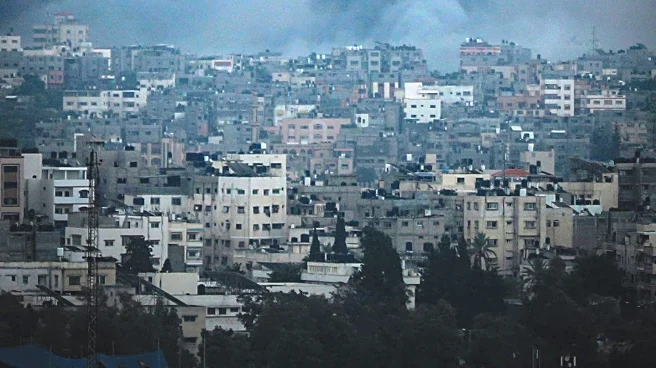What's Happening?
Medics at al-Shifa hospital in Gaza City report being overwhelmed by casualties from ongoing Israeli strikes. The hospital, one of the last functioning medical facilities in the area, is operating under dire conditions with limited medical supplies and no anaesthetics. Israeli forces are advancing into Gaza City, which they consider a Hamas stronghold, leading to mass displacement of Palestinians. The hospital is struggling to manage the influx of severely injured patients, with operations being conducted in unsanitary conditions. The Jordanian armed forces have relocated their field hospital due to damage from nearby shelling.
Why It's Important?
The situation at al-Shifa hospital underscores the severe humanitarian crisis in Gaza, highlighting the impact of military operations on civilian infrastructure and healthcare. The overwhelming number of casualties and lack of medical resources pose significant challenges to providing adequate care, exacerbating the suffering of the local population. The international community's response to these conditions could influence humanitarian aid efforts and diplomatic interventions aimed at resolving the conflict. The hospital's plight also raises questions about the protection of medical facilities in war zones.
What's Next?
The continued advancement of Israeli forces into Gaza City may lead to further displacement and increased casualties, putting additional strain on medical facilities. International humanitarian organizations might increase efforts to provide medical supplies and support to overwhelmed hospitals. Diplomatic pressure on Israel to allow humanitarian aid and medical assistance into Gaza could intensify. The situation may also prompt discussions on the protection of healthcare workers and facilities in conflict areas.
Beyond the Headlines
The crisis at al-Shifa hospital highlights ethical concerns regarding the targeting of civilian infrastructure during military operations. The international community may need to address the legal implications of such actions and advocate for stronger protections for medical facilities in conflict zones. Long-term, this could lead to increased efforts to establish international protocols ensuring the safety and functionality of healthcare systems in war-torn regions.









